A Guide for Protecting Your Business Data

Here is a guide on all you can do to make sure that your business data is protected.
Back Up Your Data on a Daily Basis
A huge threat to your data can be data loss, and it is very easily done. Even if you are completely careful with your business data and avoid human error, there are many reasons you could end up losing data if it is not backed up, such as computer viruses, system problems or even power failures.
Backing up your data at least once a day — ideally storing data offsite — will help your data to remain protected.
Implement Virus and Malware Protection Methods
Viruses, malware and other cyber crime will always be a threat to business data, and all you can do is put up the maximum defense measures to keep your data protected. This means installing the right anti-virus software and firewall protection.
When it comes to cyber crime, it is also about staying aware of any new or evolving threats. Training an internal team on how to recognize threats can help to increase your protection (such as how to identify a potentially threatening email or suspicious activity).
Be Secure When Sharing Data
Data sharing is when data can easily become compromised. If data is being shared in unsecure ways, this can risk data hacking or even lost data through human error.
A great method for ensuring safe data sharing — if your team needs to work together with data securely — is by implementing a data sharing solution you can trust, like the platform from ovatiotech.com. This means data can be regulated and shared through a secure software channel so that your team can comfortably manage data efficiently.
Make Updates a Regular Item on the Agenda
The technology you use in business and where you store your data will be able to work most efficiently when regularly updated. Outdated programs and systems will easily become more vulnerable.
For ease, you should try to install automatic updates so that updates can always be made when they need to be. If manual updates are preferable, be sure to create a schedule and reminders so that it is not neglected.
Dispose of Any Business Data Securely
Not all data needs to be kept, and there may come a time when you need to dispose of old business data. Even if the data is no longer relevant, it still leaves your business vulnerable if the data gets in the wrong hands.
If you have hard drives or data files to dispose of, be sure to use professional services to completely overwrite and remove any information, or understand how to successfully remove the data yourself, as most of the time simply deleting a file does not mean it cannot be recovered by an outside party if they gain access to a device.
Always take the right steps to fully protect your business data.

